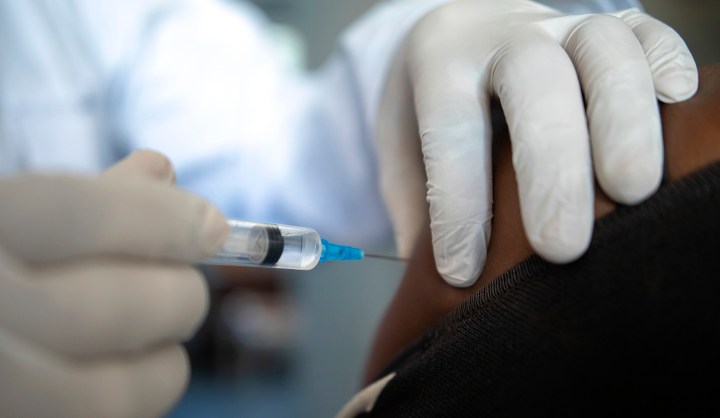Coronavirus
Oxford-AstraZeneca Covid vaccine study shows dual immune action

A coronavirus vaccine the University of Oxford is developing with AstraZeneca Plc showed promising results in early human testing, a sign of progress in the high-stakes pursuit of a shot to defeat the pathogen.
The vaccine increased levels of both protective neutralizing antibodies and immune T-cells that target the virus, according to the study organizers. The results were published Monday in The Lancet medical journal.
AstraZeneca shares rose as much as 10% in London but gave up some of those gains to trade 2.8% higher as researchers cautioned that the results were preliminary. A positive outcome had been widely expected after reports last week lifted the stock, with the vaccine already in more advanced trials.
The Drugs and Vaccines That Might End the Coronavirus Pandemic
“We are seeing very good immune responses, not just on neutralizing antibodies but of T-cells as well,” said Adrian Hill, head of Oxford’s Jenner Institute, in an interview. “We’re stimulating both arms of the immune system.”
Other vaccine projects, including shots being developed by China’s CanSino Biologics Inc., and a partnership of Pfizer Inc. and BioNTech SE also delivered positive trial updates Monday. The results boost optimism about ways to counter a pandemic that’s killed more than 600,000 people and triggered economic turmoil since erupting earlier this year. Moderna Inc., another front-runner, released results last week from an early-stage test that showed its vaccine raised levels of antibodies that fight the virus.
Key Step
Although stimulating production of neutralizing antibodies doesn’t prove a vaccine will be effective, it’s considered an important early step in testing. Results from testing in animals had already shown the Oxford-AstraZeneca shot provoked an immune response.
The Phase 1 trial, which took place between April 23 and May 21, involved 1,077 healthy adults aged 18 to 55 with no history of Covid-19. A control group were given a meningitis vaccine as a placebo and 10 participants received two doses of the shot one month apart. The vaccine caused minor side effects, which could be reduced by taking paracetamol. There were no serious adverse events from the jab.
Most of the participants in the study received a single dose of vaccine. Astra will prioritize a two-shot regimen in future testing, Hill said.
“It gives higher titres of antibodies, which is important going forward,” he said. Moderna will also test a two-dose regimen.
A single dose of Oxford vaccine resulted in a four-fold increase in antibodies to the virus’s spike protein in 95% of participants one month after injection, AstraZeneca said in a statement. SARS-CoV-2 uses the spike protein to enter cells. A T-cell response was induced in all participants who got the vaccine, peaking by day 14 after injection.
“It’s good, not unexpected, but good to have it confirmed. The vaccine worked and developed the all-important neutralizing antibodies, in most cases after one shot and in all cases after 2 shots,” said Ian Jones, professor of biomedical sciences at the University of Reading.
Across the world, about 160 coronavirus vaccines are in various stages of development, according to the World Health Organization. The Oxford shot is close to the front of the pack and has already begun final-stage tests. AstraZeneca has said it may begin delivering doses to the U.K. as early as September.
Covid Vaccine Front-Runner Is Months Ahead of Her Competition
“We want other companies to have vaccines that work as well because the world will get more vaccine sooner,” Hill said. “We just feel there is an advantage of having both arms of the immune system stimulated well.”
AstraZeneca received a boost when the U.S. pledged as much as $1.2 billion toward development. Under its agreement with the British drugmaker, the U.S. could begin receiving supplies as early as October.
The U.K. has also struck a supply agreement for the shot, but on Monday it secured access to other drugmakers’ experimental vaccines to hedge its bets and garner enough doses to cover its population of 66 million. The government secured deals with Pfizer, BioNTech and Valneva SE.
Covid Fight
Companies and universities are relying on an array of approaches in the fight against Covid-19. The Oxford team has developed a technology that can speed up the process by using a harmless virus to carry some of the pathogen’s genetic material into cells to generate an immune response. The proposed vaccine is made from a weakened version of a common cold virus that’s genetically changed to make it unable to grow in humans.
Oxford has inserted genetic material from the surface spike protein of the SARS-CoV-2 virus as a way of tricking the immune system into fighting back. The platform stimulates both antibodies and high levels of killer T-cells, a type of white blood cell that helps the immune system destroy infection.
“We’re very encouraged,” Hill said. While the test doesn’t prove the vaccine will work, “I think we’re a bit more confident it should work this week than last week.” DM
"Information pertaining to Covid-19, vaccines, how to control the spread of the virus and potential treatments is ever-changing. Under the South African Disaster Management Act Regulation 11(5)(c) it is prohibited to publish information through any medium with the intention to deceive people on government measures to address COVID-19. We are therefore disabling the comment section on this article in order to protect both the commenting member and ourselves from potential liability. Should you have additional information that you think we should know, please email [email protected]"





 Become an Insider
Become an Insider